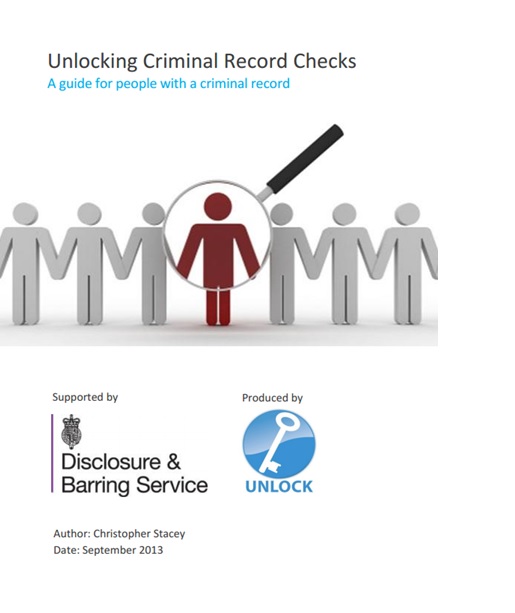On a daily basis, our helpline gets calls from people who are applying for work and don’t know where they stand because of criminal record checks that (increasingly) employers are carrying out.
A couple of years ago, we approached the DBS (Disclosure & Barring Service – known as the CRB at that time) and raised this as a matter of concern. They agreed to support the production of a guide, specifically for people with a criminal record, designed to explain in detail the criminal record checking process, with particular focus on the specific issues that people with a criminal record might face.
The result is a detailed guide which was written by Unlock and which was circulated by the DBS (it was announced in DBS News September 2013). Download the guide here or click the image below.
For Unlock, this guide represents a number of things:
- The DBS has recognised people with a criminal record as being a particular audience, and have responded by supporting the production and circulation of this guide
- During the writing of the guide, Unlock asked a number of questions of the DBS about their processes, and in a number of respects, the DBS have responded by working to improve aspects of their process
- In particular, the guide shines a light on the process of ‘eligibility’. The Establish Eligibility Process Flow-chart (page 19) sets out a clear and detailed process for individuals to follow if they believe that an employer might be asking for the wrong level of criminal record check. It also documents the specific ‘Eligibility query’ process that the DBS has in place to respond to concerns around eligibility from individuals
- It provides a starting point by which evidence can be collected about how employers and the DBS are dealing with eligibility issues
Since the guide was published, we’ve already started getting feedback from people. A couple of examples include:
People asking questions of employers:
I went into Human Resources and asked why they were asking for enhanced checks. They wasn’t sure, and once I pointed out that a basis disclosure could be used, they were happy to accept this, and changed their policy as a result. Given my criminal record is spent, it means I don’t have to resign, which I feel I would have had to do otherwise”
People using the DBS’s ‘Eligibility query’ process:
My employer was insisting on an enhanced level check for a job working as a door-to-door salesman. I tried to talk to them, but they wouldn’t listen, so I didn’t have any other option but to consent to the check. Following Unlock’s guidance, I raised a query with the DBS, and they looked into it. The outcome of this was that the DBS wrote to my employer saying that they didn’t think that the position was eligible, and that they should do a basic level check. Result!”
This guide is an important first step, but there is still a long way to go to ensure that employers are carrying out the correct level of checks and at the right time.
We’re keen to get your feedback on this guide, and in particular if you’ve tried to make use of the advice contained it in, either in your dealings with an employer or in raising an eligibility query with the DBS.
To go alongside this guide, we’ve also recently published two articles that will help people with convictions understand a bit more about dealing with their criminal record in the world of work:
- ‘Ways to find out about your criminal record’ available here
- ‘Disclosing your convictions to employers’ available here
Questions?
If you have any questions about this information, please contact us.
If you’d like to discuss this information with others, there is a specific thread on our online forum.


Comments
Add Comment